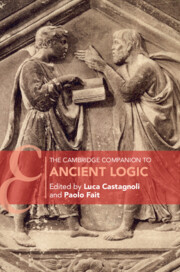Book contents
- The Cambridge Companion to Ancient Logic
- Other Volumes in the Series of Cambridge Companions
- The Cambridge Companion to Ancient Logic
- Copyright page
- Contents
- Contributors
- Introduction
- I The Development of Logic in Antiquity
- 1 The Prehistory of Logic
- 2 Aristotle and Theophrastus
- 3 Megarians and Stoics
- 4 Late Antiquity
- II Key Themes
- III The Legacy of Ancient Logic
- Bibliography
- Abbreviations
- Index of Passages
- General Index
- Other Volumes in the Series of Cambridge Companions
1 - The Prehistory of Logic
from I - The Development of Logic in Antiquity
Published online by Cambridge University Press: 29 April 2023
- The Cambridge Companion to Ancient Logic
- Other Volumes in the Series of Cambridge Companions
- The Cambridge Companion to Ancient Logic
- Copyright page
- Contents
- Contributors
- Introduction
- I The Development of Logic in Antiquity
- 1 The Prehistory of Logic
- 2 Aristotle and Theophrastus
- 3 Megarians and Stoics
- 4 Late Antiquity
- II Key Themes
- III The Legacy of Ancient Logic
- Bibliography
- Abbreviations
- Index of Passages
- General Index
- Other Volumes in the Series of Cambridge Companions
Summary
Greeks were intensely competitive. Their historians dated events by who had won what in the Olympics (Thucydides 3.8.1, 5.49.1, Xenophon Hellenica 1.2.1, 2.3.1); they would hold athletic contests as we might hold a memorial service (Aristotle Constitution of Athens 58.1); they staged dramas as competitive spectator sport (Aristotle Constitution of Athens 56.3–5); they had beauty contests for both men and women (Athenaeus 13.610a, Andocides 4.42); and when they sneered at competitions, this was to express their own superiority over the winners (Xenophanes DK 21B2, Thucydides 1.22.4). In particular, Greeks had competitions in which competitors strove to outdo one another in reasoning and argument. Protagoras was, according to Diogenes Laertius 9.52, ‘the first … to arrange contests of speeches’, and he declares that he has taken part in many such contests himself (Plato Protagoras 335a).
- Type
- Chapter
- Information
- The Cambridge Companion to Ancient Logic , pp. 21 - 36Publisher: Cambridge University PressPrint publication year: 2023
- 1
- Cited by

